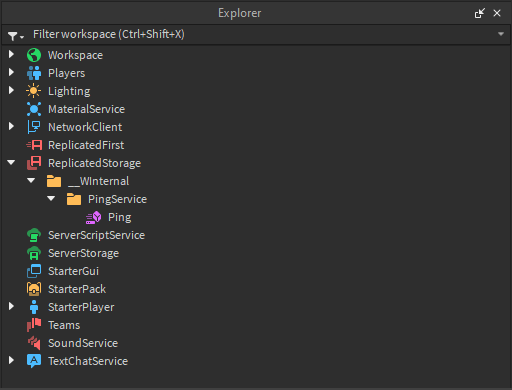Basic Usage
Since Weaver works in a single-script architecture, it's best to start your projects off with it in mind. The most basic version of Weaver works by having one Script in ServerScriptService, and one LocalScript in StarterPlayerScripts, both starting Weaver using their respective WeaverService.Start() and WeaverClient.Start() methods. At the very least, both scripts should look like this:
local Weaver = require(Weaver) -- Weaver's actual path would likely be somewhere in ReplicatedStorage
Weaver.Start() -- Hooray, Weaver has started!
That is the bare minimum that Weaver needs to run. However, this does not load any WeaverServices or WeaverControllers. To do so, we need to create them.
Let's create a service on the server. It can be anything, but for this example, a simple "ping" service can work. Let's say that we want it to communicate with the client to play ping-pong. When a service is created via WeaverServer.CreateService(), it will always have a Client table. There is more detail on how WeaverServices work in the Communication page.
Methods
First, we're going to set up the service, and then specify a method to respond to any client's request to ping the server.
-- This is being ran on the server
-- CreateService's parameter is a table,
-- and Name has to be specified as a string for it to be registered
local PingService = Weaver.CreateService{ Name = "PingService" }
-- Since this method is going to be shared with the client, specify it under the Client table
function PingService.Client:Ping(): string
return "Pong!"
end
-- Finally, start Weaver after our service is created
Weaver.Start()
Then, on the client, you can get PingService using WeaverClient.GetService(), and run PingService:Ping() to play ping-pong.
-- This is being ran on the client
local Weaver = require(Weaver)
-- Since Weaver needs to be started to get services and controllers,
-- it's done before we call Weaver.GetService()
Weaver.Start()
-- Get PingService; it's almost like calling game:GetService()
local PingService = Weaver.GetService("PingService")
-- Start our game of ping-pong on the client
print("Ping!")
local pingStart: number = os.clock()
-- Call PingService:Ping(), which will return "Pong!"
local pongOutput: string = PingService:Ping()
-- Calculate how long it took for the server to respond to our request
local pongTime: number = os.clock() - pingStart
warn(pongOutput, "took", pongTime) -- Pong! took 0.31758950000221375
Just like that, we've created a service to play ping-pong with. Under the hood, Weaver converts your function into a RemoteFunction, though it is handled as if it were a normal function on the client. If you find Weaver's internal structure while running your game, you can see how it's built:

RemoteSignals
Let's say that we want to use a RemoteEvent instead, and in this case, for posting a message via MessagingService. We can use WeaverServer.CreateRemoteSignal() to create a signal which will be listened to on the client. In practice, the server would look something like this:
-- This is being ran on the server
local MessagingService = game:GetService("MessagingService")
-- This will be the topic we post to
local POST_TOPIC: string = "GlobalMessages"
type Payload = { name: string, message: string }
-- First, create PostService
local PostService = Weaver.CreateService{ Name = "PostService" }
-- Then, create the remote signal.
-- Trying to use it before Weaver has started will throw an exception
PostService.Client.SendMessage = Weaver.CreateRemoteSignal()
-- Connections are done within WeaverInit so that they are ready on WeaverStart
function PostService:WeaverInit(): ()
-- First, subscribe to listen to payloads from SendMessage
MessagingService:SubscribeAsync(POST_TOPIC, function(received: { Data: Payload, Sent: number }): ()
local payload: Payload = received.Data
print("Player", payload.name, "sent", payload.message)
end)
-- Then, connect SendMessage.
-- This will take a string as its message parameter
self.Client.SendMessage:Connect(function(client: Player, message: string): ()
-- Normally, you'd want to add sanity checks,
-- but this is just an example
local payload: Payload = {
name = client.Name;
message = message;
}
MessagingService:PublishAsync(POST_TOPIC, payload)
end)
end
Under the hood, this simply creates a RemoteEvent. This differs from methods as they do not yield when you call RemoteSignal:Fire().
Now, let's say that we want to call SendMessage from the client. All we need to do is call SendMessage:Fire(), as it gets registered as a RemoteSignal when Weaver starts. This is what the client may look like:
-- This is being ran on the client
local Weaver = require(Weaver)
Weaver.Start()
local PostService = Weaver.GetService("PostService")
PostService.SendMessage:Fire("Hello from the client!") -- That's all!
More information on communication can be found on the Communications page.